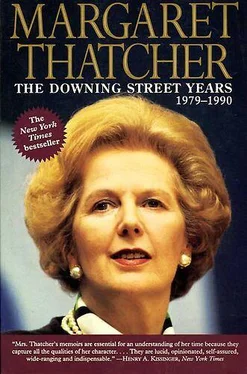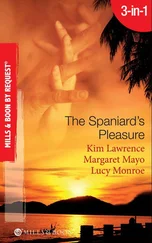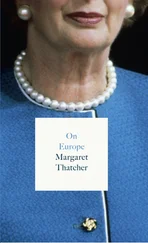Margaret Thatcher - The Downing Street Years, 1979-1990
Здесь есть возможность читать онлайн «Margaret Thatcher - The Downing Street Years, 1979-1990» весь текст электронной книги совершенно бесплатно (целиком полную версию без сокращений). В некоторых случаях можно слушать аудио, скачать через торрент в формате fb2 и присутствует краткое содержание. Город: New York, Год выпуска: 2010, ISBN: 2010, Издательство: HarperCollins, Жанр: Биографии и Мемуары, на английском языке. Описание произведения, (предисловие) а так же отзывы посетителей доступны на портале библиотеки ЛибКат.
- Название:The Downing Street Years, 1979-1990
- Автор:
- Издательство:HarperCollins
- Жанр:
- Год:2010
- Город:New York
- ISBN:978-0-062-02910-2
- Рейтинг книги:3 / 5. Голосов: 1
-
Избранное:Добавить в избранное
- Отзывы:
-
Ваша оценка:
- 60
- 1
- 2
- 3
- 4
- 5
The Downing Street Years, 1979-1990: краткое содержание, описание и аннотация
Предлагаем к чтению аннотацию, описание, краткое содержание или предисловие (зависит от того, что написал сам автор книги «The Downing Street Years, 1979-1990»). Если вы не нашли необходимую информацию о книге — напишите в комментариях, мы постараемся отыскать её.
[Best viewed with CoolReader.]
The Downing Street Years, 1979-1990 — читать онлайн бесплатно полную книгу (весь текст) целиком
Ниже представлен текст книги, разбитый по страницам. Система сохранения места последней прочитанной страницы, позволяет с удобством читать онлайн бесплатно книгу «The Downing Street Years, 1979-1990», без необходимости каждый раз заново искать на чём Вы остановились. Поставьте закладку, и сможете в любой момент перейти на страницу, на которой закончили чтение.
Интервал:
Закладка:
I held these conclusions very tentatively at the war’s end. But they hardened into firm convictions in the 1940s and ’50s when, in the face of the Soviet threat, those institutions like NATO which represented international co-operation between strong nation-states proved far more effective in resisting that threat than bodies like the United Nations which embodied a superficially more ambitious but in reality weaker internationalism. My concern in 1979 was that the resistance of NATO to the latest Soviet threat was less adequate than I would have liked precisely because national morale in most NATO countries, including Britain, was so depressed. To resist the Soviet Union effectively it would be necessary to restore our own self-confidence (and, of course, our military strength) beforehand.
I recalled a similar collapse of national morale from my first days in active politics as a Young Conservative fighting the 1945–51 Labour Government. Some nostalgia for the austerity period apparently lingers. That is, I believe, an exercise in vicarious sacrifice, always more palatable than the real thing. Seen from afar, or from above, whether by a socialist gentleman in Whitehall or by a High Tory, socialism has a certain nobility: equal sacrifice, fair shares, everyone pulling together. Seen from below, however, it looked very different. Fair shares somehow always turn out to be small shares. Then, someone has to enforce their fairness; someone else has to check that this fairness does not result in black markets or under-the-counter favouritism; and a third person has to watch the first two to make sure that the administrators of fairness end up with no more than their fair share. All this promotes an atmosphere of envy and tittle-tattle. No one who lived through austerity, who can remember snoek, Spam, and utility clothing, could mistake the petty jealousies, minor tyrannies, ill-neighbourliness and sheer sourness of those years for idealism and equality. Even the partial dismantling of the ration-book state in the early 1950s came as an immense psychological relief to most people.
I particularly remember the political atmosphere of those years. Although the Tory rethinking associated with Rab Butler and the Conservative Research Department was important in reviving the Tory Party’s intellectual claims to office, there was a somewhat more robust and elementary rethinking going on at the grass roots. Our inspiration was less Rab Butler’s Industrial Charter than books like Colm Brogan’s anti-socialist satire, Our New Masters , which held up the moral pretensions of socialists to relentless and brilliant mockery, and Hayek’s powerful Road to Serfdom , dedicated to ‘the socialists of all parties’. Such books not only provided crisp, clear analytical arguments against socialism, demonstrating how its economic theories were connected to the then depressing shortages of our daily lives; but by their wonderful mockery of socialist follies, they also gave us the feeling that the other side simply could not win in the end. That is a vital feeling in politics; it eradicates past defeats and builds future victories. It left a permanent mark on my own political character, making me a long-term optimist for free enterprise and liberty and sustaining me through the bleak years of socialist supremacy in the 1960s and ’70s.
I was elected to the House of Commons in 1959 as the Member for Finchley, and later served in the Governments of Harold Macmillan, Alec Douglas-Home and Ted Heath. I enjoyed my early ministerial career: it was an absorbing education both in the ways of Whitehall and in the technicalities of pensions policy. But I could not help noticing a curious discrepancy in the behaviour of my colleagues. What they said and what they did seemed to exist in two separate compartments. It was not that they consciously deceived anyone; they were in fact conspicuously honourable. But the language of free enterprise, anti-socialism and the national interest sprang readily to their lips, while they conducted government business on very different assumptions about the role of the state at home and of the nation-state abroad. Their rhetoric was prompted by general ideas they thought desirable, such as freedom; their actions were confined by general ideas they thought inevitable, such as equality.
At the start, as an inexperienced young minister, I had to live with this. When we went into Opposition after the 1964 and 1966 defeats, I joined with Ted Heath in a rethinking of party policy which seemed to foreshadow much of what we later came to call Thatcherism. ‘Selsdon Man’ won the 1970 election on a radical Conservative manifesto. [4] The term was Harold Wilson’s, derived from the name of the Selsdon Park Hotel where the Conservative Shadow Cabinet finalized its right-wing programme for the 1970 general election.
But the Party’s conversion to its own philosophy proved skin-deep. After two years of struggling to put it into effect, the Heath Government changed course equally radically and adopted a programme of corporatism, intervention and reflation. I had my doubts, but as a first-time Cabinet minister I devoted myself principally to the major controversies of my own department (Education), and left more senior colleagues to get on with their own responsibilities. Yet all my instincts chafed against this. Perhaps because of my very unease, I noticed earlier than most that the very policies adopted as concessions to reality were also the least successful. Incomes policy, in addition to restricting people’s freedom, was invariably the prelude to a wages explosion. And that was one among many. Almost all the policies hawked about by ‘practical’ men on ‘pragmatic’ grounds turned out in the end to be highly impractical. Yet this fact never seemed to dent their enthusiasm. Indeed, Ted Heath responded to the defeat of his Government on the issue of incomes policy in the first 1974 election by proposing a still more ambitious scheme of interventionist government in the second.
While I was pondering on this mystery, Keith Joseph made a remark which reverberated powerfully in my mind. ‘I have only recently become a Conservative,’ he said, meaning that for his first twenty years in politics, many of them at the top, he had been a sort of moderate Fabian. I recognized both the truth of Keith’s remark and also that my own case was subtly different: I had always been an instinctive Conservative, but I had failed to develop these instincts either into a coherent framework of ideas or into a set of practical policies for government. And the faster the illusions of practical men crumbled before the onrush of reality, the more necessary it was to set about developing such a framework. Keith and I established the Centre for Policy Studies to do just that.
With Keith, I had come to see ever more clearly that what appeared to be technical arguments about the relationship between the stock of money and the level of prices went right to the heart of the question of what the role of government in a free society should be. It was the job of government to establish a framework of stability — whether constitutional stability, the rule of law, or the economic stability provided by sound money — within which individual families and businesses were free to pursue their own dreams and ambitions. We had to get out of the business of telling people what their ambitions should be and how exactly to realize them. That was up to them. The conclusions I reached fitted precisely those which my own instincts and experience themselves suggested. But I was aware that all too few of my colleagues in the Shadow Cabinet and in the House of Commons saw matters like this. I knew that I would have to go carefully to persuade them of what needed to be done and why.
The years in Opposition had often been frustrating, but at least they had given me the chance to see that our policies for government reflected my priorities and had been worked out in sufficient detail. We had published the outlines of our policy in The Right Approach in 1976 and The Right Approach to the Economy the following year. We had toyed with the idea of other similar documents, but had in fact come down in favour of speeches to set out our policy proposals. Behind the public pronouncements lay years of intense work by policy groups, usually chaired by the relevant Chief Shadow Spokesmen, whose conclusions were brought before the Leader’s Consultative Committee, as the Shadow Cabinet was formally known, where policies were discussed, modified, rejected or approved.
Читать дальшеИнтервал:
Закладка:
Похожие книги на «The Downing Street Years, 1979-1990»
Представляем Вашему вниманию похожие книги на «The Downing Street Years, 1979-1990» списком для выбора. Мы отобрали схожую по названию и смыслу литературу в надежде предоставить читателям больше вариантов отыскать новые, интересные, ещё непрочитанные произведения.
Обсуждение, отзывы о книге «The Downing Street Years, 1979-1990» и просто собственные мнения читателей. Оставьте ваши комментарии, напишите, что Вы думаете о произведении, его смысле или главных героях. Укажите что конкретно понравилось, а что нет, и почему Вы так считаете.












